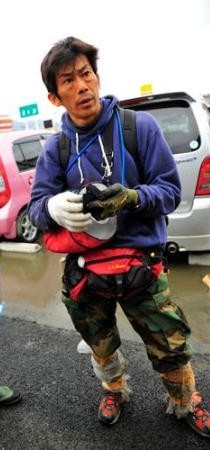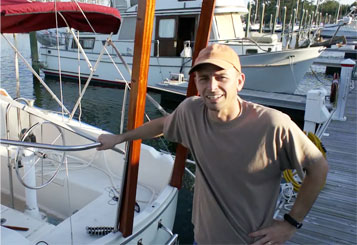 Hideaki Akaiwa: Badass of the weekThis week I came across an extraordinary story about a man named Hideaki Akaiwa. He lives in the town of Ishinomaki, Japan, and works just outside it; he was at work when the tsunami hit. Told by emergency workers he couldn’t go back into town because it was too dangerous, he somehow located scuba gear, dove into the roiling waters, swam through the debris, located his house, and saved his wife. A couple of days later, he went back in and saved his mother.
Hideaki Akaiwa: Badass of the weekThis week I came across an extraordinary story about a man named Hideaki Akaiwa. He lives in the town of Ishinomaki, Japan, and works just outside it; he was at work when the tsunami hit. Told by emergency workers he couldn’t go back into town because it was too dangerous, he somehow located scuba gear, dove into the roiling waters, swam through the debris, located his house, and saved his wife. A couple of days later, he went back in and saved his mother.
Cool, eh? I wouldn’t swear in a court of law that it’s true — it certainly sounds apocryphal, and the Japanese media doesn’t seem to have picked it up — but it’s been covered by several legit U.S. newspapers and if it’s bogus, nobody’s confirmed it yet. Regardless, late Tuesday afternoon, I put this on Twitter:
Dude threw on scuba gear, jumped into a TSUNAMI, dodged debris, found his house & his wife, & saved her. I mean, damn. http://bit.ly/g5vgle
I didn’t think much of it. But then … well, I’ve never seen anything like it. People started retweeting it. And more people. And more people. I must have seen it RT’d a thousand times. It’s still going on. It is far and away the biggest response I’ve ever gotten, or even seen, in social media.
As interesting as the volume of responses were the themes that jumped out. Lots of guys joked that Akaiwa has raised the bar unreasonably high. Lots of females said wistfully, “I wish I had someone who loved me like that.” But the most common response was some form of gratitude. People seem genuinely buoyed by the reaffirmation that human beings can be skillful, noble, and courageous. The news in aggregate looks so bad these days, a story of simple decency can seem like a ray of sunshine.
It’s not hard to see why people are fascinated by human dramas like this — they are the kinds of stories we’ve been designed to tell and to hear over centuries of evolution. Our brains are hard-wired to engage with narrative.
Now consider another story. This one is about Japanese government bureaucrats working over decades to strengthen building codes, create early warning systems, educate the citizenry on proper emergency procedures, and otherwise increase the country’s resiliency in the face of disaster. It’s a story of writing memos, commissioning studies, and attending meetings — many, many meetings. It’s about gladhanding the right people and hashing out legislative language.
Unlike Hideaki Akaiwa’s, the story of Japan’s bureaucrats is pretty boring. There are no villains, except myopia and inertia. It’s difficult to conceive of the pencil-pushers involved as heroes. Nothing about it makes our blood race. It doesn’t inspire gratitude.
And yet! Japan’s bureaucracy has saved far, far more lives than solitary heroes like Hideaki Akaiwa. If we were capable of imagining each of those saved lives individually, as wives and mothers in peril, carried from flooding houses by wet-suited saviors, the significance of that fact might really sink in. But we cannot imagine that; we are too limited. Our affect is drained by statistics and counterfactuals. Our amygdalae do not support our utilitarian moral aspirations. Nobody can get jazzed about Japanese bureaucrats.
Anyway, it’s often been said in relation to climate change that it’s difficult for people to recognize danger, at a visceral level, when the “foe” is a slow-moving global phenomenon. We’re not good at recognizing and acting on those risks. But it’s also worth noting the flip side: It’s difficult for people to recognize virtue, too, when it looks like one more little incremental thing, one turn of the handle in the “strong and slow boring of hard boards” that is political and social progress. We are excited by, and reward, the dramatic individual act of courage. We too rarely recognize or celebrate the steady, painstaking work of organizing public institutions to produce more humane outcomes.
I always think about Rep. Henry Waxman (D-Calif.). He plugged away for over a decade to expand and strengthen the Clean Air Act. He endured endless delays, disappointments, and failures … and just kept after it. In the end, his work (and the work of many others, of course) secured the 1990 Clean Air Act amendments, which are not only some of the most cost-effective regulations in U.S. history but save thousands of lives, every year, year after year.
Waxman never swam through a tsunami, but he helped a prevent an enormous amount of suffering. I know we can’t just rewire ourselves to change our instinctive affective responses; our evolutionary legacy is what it is. We’ll never stop getting a thrill from heroes like Akaiwa and we’ll never start getting one from, oh, utility reform advocates.
But at the least we can be better aware of this bias and conscious of the need to counterbalance it. We can do more, in our educational system, social attitudes, and public policy, to celebrate and reward those unsexy heroes working every day to make things just a little bit better for a lot of people.



